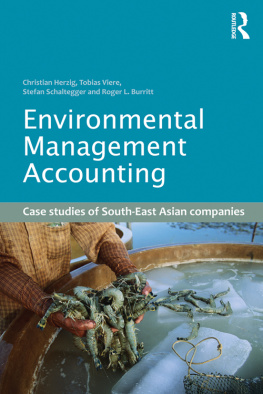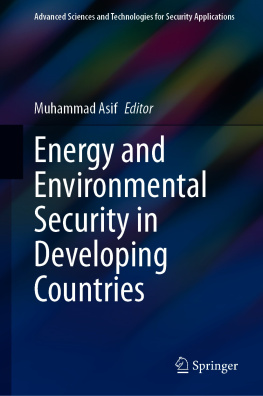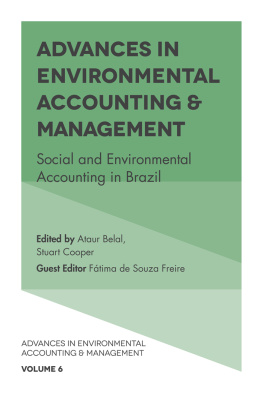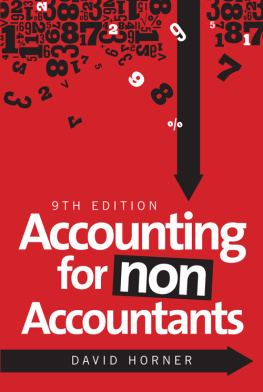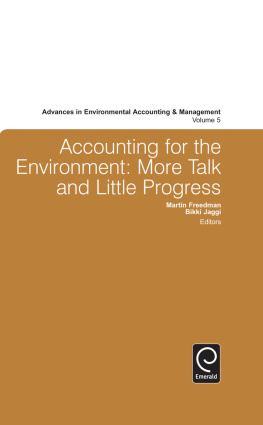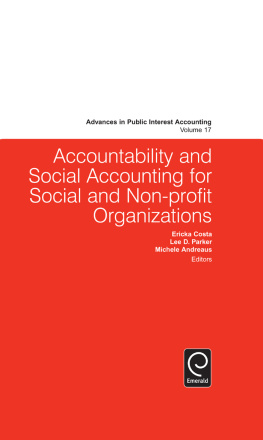ENVIRONMENTAL MANAGEMENT ACCOUNTING
Sustainable development will not happen without substantial contributions from and leading roles of companies and business organisations. This requires the provision of adequate information on corporate social and ecological impacts and performance. For the last decade, progress has been made in developing and adapting accounting mechanisms to these needs but significant work is still needed to tackle the problems associated with conventional accounting.
Until recently, research on environmental management accounting (EMA) has concentrated on developed countries and on costbenefit analysis of implementing individual EMA tools. Using a comparative case study design, this book seeks to redress the balance and improve the understanding of EMA in management decision-making in emerging countries, focussing specifically on South-East Asian companies. Drawing on 12 case studies, taken from a variety of industries, Environmental Management Accounting: Case Studies of South-East Asian Companies explores the relationship between decision situations and the motivation for, and barriers to, the application of clusters of EMA tools as well as the implementation process itself.
This book will be useful to scholars interested in the environmental and sustainability management accounting research field and those considering specific approaches to EMA within emerging economies.
Christian Herzig is Lecturer at Nottingham University, UK.
Tobias Viere is Research Fellow at Leuphana University of Lneburg, Germany.
Stefan Schaltegger is Professor at Leuphana University of Lneburg, Germany.
Roger L. Burritt is Professor at University of South Australia, Australia.
ENVIRONMENTAL MANAGEMENT ACCOUNTING
Case studies of South-East Asian companies
Christian Herzig, Tobias Viere, Stefan Schaltegger and Roger L. Burritt

First published 2012
by Routledge
2 Park Square, Milton Park, Abingdon, Oxon OX14 4RN
Simultaneously published in the USA and Canada
by Routledge
711 Third Avenue, New York, NY 10017
Routledge is an imprint of the Taylor & Francis Group, an informa business
2012 Christian Herzig, Tobias Viere, Stefan Schaltegger and Roger L. Burritt
The right of Christian Herzig, Tobias Viere, Stefan Schaltegger and Roger L. Burritt to be identified as the authors of this work has been asserted by them in accordance with sections 77 and 78 of the Copyright, Designs and Patents Act 1988.
All rights reserved. No part of this book may be reprinted or reproduced or utilised in any form or by any electronic, mechanical, or other means, now known or hereafter invented, including photocopying and recording, or in any information storage or retrieval system, without permission in writing from the publishers.
Trademark notice: Product or corporate names may be trademarks or registered trademarks, and are used only for identification and explanation without intent to infringe.
British Library Cataloguing in Publication Data
A catalogue record for this book is available from the British Library
Library of Congress Cataloging in Publication Data
Environmental management accounting : case studies in South-East Asian companies / Christian Herzig ... [et al.].
p. cm.
Includes bibliographical references and index.
1. Environmental auditingSoutheast AsiaCase studies. 2. Agricultural industriesEnvironmental aspectsSoutheast Asia. 3. IndustriesEnvironmental aspectsSoutheast Asia. I. Herzig, Christian.
TD194.7.E5975 2012
333.70959dc23
2011036757
ISBN: 9780415694315 (hbk)
ISBN: 9780203125366 (ebk)
FIGURES
TABLES
About The Authors
Christian Herzig is Lecturer in Sustainability Accounting and Reporting at the International Centre for Corporate Social Responsibility (ICCSR) at Nottingham University Business School, UK. Christian has held previous postdoctoral appointments in Germany, Australia, and the UK.
Tobias Viere is Research Fellow of the Centre for Sustainability Management (CSM), Leuphana University of Lneburg, Germany, and Research and Development Representative of ifu Hamburg GmbH, Germany. He is also a member of the ISO international expert working group on Material Flow Cost Accounting.
Stefan Schaltegger is Professor of Management and Head of the Centre for Sustainability Management (CSM) and the MBA Sustainability Management, Leuphana University of Lneburg, Germany. He is the chairman of Environmental Management Accounting Network (EMAN) Europe and Global and is the co-author with Roger Burritt of Contemporary Environmental Accounting: Issues, Concept and Practice (2000, Greenleaf).
Roger L. Burritt is Professor of Accounting and Director of the Centre for Accounting, Governance and Sustainability, University of South Australia, Australia. He is the founder of the Asia-Pacific Centre for Environmental Accountability (APCEA) and chairman of EMAN Asia Pacific. He is co-author of the book Contemporary Environmental Accounting: Issues, Concept and Practice (2000, Greenleaf) and is editor-in-chief of the book Environmental Management Accounting and Supply Chain Management.
Foreword
Craig Deegan, Professor of Accounting, RMIT University, Melbourne, Australia
It has never been more critical for organisations of all sizes and across all sectors to monitor and control the social and environmental implications of their operations. To enable various stakeholders, such as investors, consumers, employees, local communities, government, and so forth, to make informed decisions about whether they should support particular organisations, they need information about the performance of an organisation, including information about social and environmental performance. The accountant is central to this role.
Similarly, with increasing pressure to control negative social and environmental impacts of an organisation, managers require timely information about various aspects of their operation beyond those reflected in the organisations financial performance. Central to information managers needs are well-designed environmental management accounting (EMA) systems something that this valuable book addresses.
Although the case for EMA is clear, experience indicates that management generally have little understanding of the environmental costs they generate often because their accounting systems fail to supply them with such information. Accountants need to respond and find ways to incorporate environmental costs within their accounting systems. EMA facilitates this.
Because EMA is typically established for internal decision-making it is difficult for interested people, outside the organisations, to obtain information about the internal accounting processes. Bringing together a knowledgeable team of researchers and practitioners, the authors of this book are able to enter organisations across South-East Asia to provide valuable insights that would not otherwise be available.
Prior to providing case study-specific information the book provides a very useful introductory chapter which gives a general overview of EMA. As is clearly indicated, EMA systems if properly developed fulfil dual goals of reducing environmental impacts and enhancing economic performance. As the introductory material also explains, EMA systems range in complexity, but often an EMA system can be introduced without significant or costly changes being made to existing management accounting systems. As the United Nations Division Sustainable Development stated some years ago (UN DSD 2001: 3):
Next page
